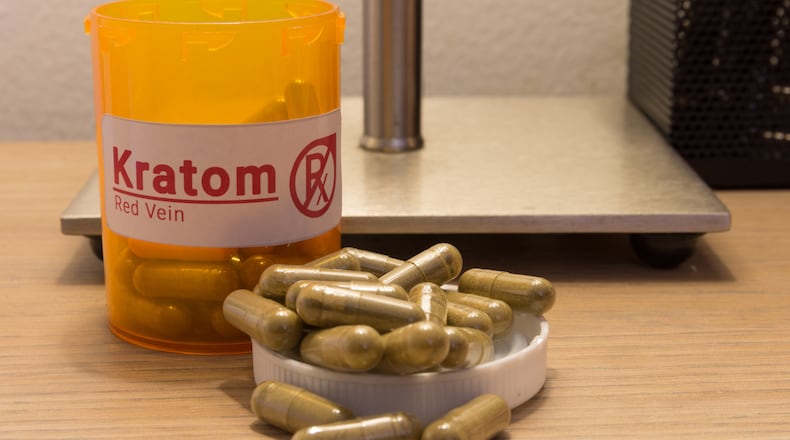Advocates and kratom retailers have touted the product as a healing herb and shared personal stories of life changing benefits, while medical groups have cited health risks and supported the proposed ban. The FDA has said that kratom marketers are making unproven claims that put consumers at risk.
MORE: Miracle plant or threat? Kratom users say it helps addiction, pain
Kratom, or mitragyna speciosa, is a plant native to Thailand, Malaysia, Indonesia and Papua New Guinea. It is now available and for sale in Ohio and has grown in popularity in recent years.
The Ohio Board of Pharmacy has been considering the rule change since last fall. There were several public comment periods as part of the process. About 6,000 comments were submitted the first round and closer to 600 public comments the second round.
The rule change was going to be considered Monday by the Joint Committee on Agency Rule Review, a committee of state representatives and senators that reviews rules to make sure they are within bounds of the authority the agency has been given by the Ohio General Assembly. However, given the signficant public comment, the pharmacy board took it off the agenda and the public comments will be considered by the pharmacy board at its September meeting, according to Ali Simon, a spokeswoman for the board.
The American Kratom Association urged members to come out to the public hearing Friday and oppose the rule change and celebrated when it was taken off the Monday agenda, saying the association “is proud to have joined the thousands of Ohio residents who raised their voices in this important effort.”
The board received support from medical groups such as the Ohio Chapter of the American Academy of Pediatrics and the Cleveland Clinic.
Rabi Ahmed, business owner of Smokers Plus, in Dayton, said the problem isn’t the product, it’s people who are abusing the product and taking it too much. Ahmed said kratom can be good for pain relief and anxiety, and he and his parents use it have used it safely for years.
“If you take it but aren’t abusing the product, it’s a great product,” he said.
Mysheika Roberts, Columbus Public Health commissioner, submitted a letter supporting the ban, saying that as stewards of public health, they agency is concerned by the lack of regulation coupled by the ease of availability.
“This classification is crucially needed due to the public health risk this substance presents, particularly because of its combined usage with other illicit drugs, like opioids,” Roberts said.
The back and forth over how to classify kratom has gone on for years at the local, state and federal level. Kratom is banned in several states including Alabama, Arkansas, Indiana, Vermont, Rhode Island, Wisconsin, as well as in Washington D.C.
Other states, like Arizona, Utah, Georgia, and Nevada, have taken a regulatory approach that creates product standards instead of a ban, which is an approach that’s been supported by the American Kratom Association as a way to preserve access and offer consumer protections.
The Ohio Department of Health reported that between 2016 and 2018, there were 15 unintentional drug overdose deaths where kratom was mentioned on the death certificate.
U.S. Food and Drug Administration has issued several warnings in recent years over kratom. This includes in 2017, when the agency issued an advisory urging consumers not to use kratom or any compounds in the plant. Then in September 2018, then FDA Commissioner Scott Gottlieb said in a warning letter that the agency continues to find marketers selling kratom with unsubstantiated claims.
MORE: First Montgomery County medical marijuana store gets OK to open in Riverside
“Science and evidence matter in demonstrating medical benefit, especially when a product is being marketed to treat serious diseases like opioid use disorder (OUD),” he wrote. “However, to date, there have been no adequate and well-controlled scientific studies involving the use of kratom as a treatment for opioid use withdrawal or other diseases in humans.”
In April 2019, FDA conducted laboratory testing of 30 different kratom products from a variety of sources to determine if they contain heavy metals and reported that its analysis found significant levels of lead and nickel at concentrations that exceed safe exposure for oral daily drug intake.
One of the sources that the pharmacy board cited was a 2019 study by Nationwide Children’s Hospital, which reported the annual number of calls related to kratom exposure in Ohio grew from 13 calls in 2011 to 682 calls in 2017. About 65 percent of these exposures occurred from 2016 through 2017, which are the two most recent years of the study.
Schedule 1 drugs
Drugs and substances are classified into different categories, or schedules. The State of Ohio Board of Pharmacy can classify a drug as Schedule 1 when it appears that there is a high potential for abuse, that it has no accepted medical use in treatment in this state, or that it lacks accepted safety for use in treatment under medical supervision.
About the Author
